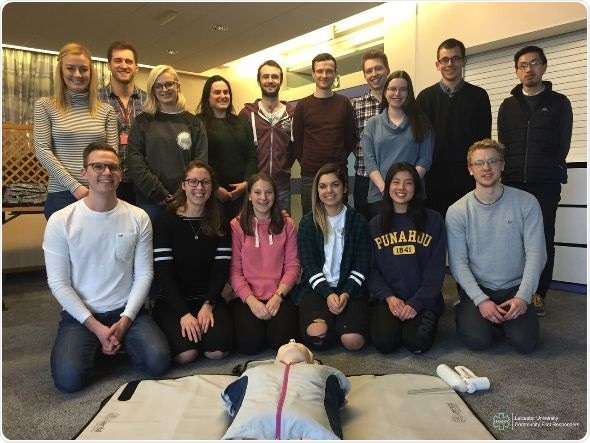Passionate medical and allied health professional students are taking their skills to the community in a life-saving initiative they are leading in Leicester City Centre.

Leicester University Community First Responders (LUCFR) are trained student volunteers who will be responding to patients in their local community to support East Midlands Ambulance Service. They have been trained to provide potentially life-saving medical treatment to 999 emergency patients while the paramedics travel to the scene.
From the moment someone calls 999, every minute counts. Research has shown that, in the event of cardiac arrest, for every minute that passes without defibrillation a person’s chances of survival can decrease by up to 10%.
With this in mind, students from the University of Leicester have set up an early intervention scheme modelled after national CFR initiatives which run throughout the UK.
A community first responder (CFR) is a volunteer who gives up their spare time to respond to 999 calls for the ambulance service, in addition to a traditional ambulance service resource being dispatched.
As community first responders are ordinary people based within the local community, they are often much closer to incidents when the initial 999 calls are made and are able to arrive within minutes to start lifesaving treatment before the ambulance crew arrive.
The scheme was started to reduce the time taken for life-saving treatment to be initiated for local people suffering from medical emergencies such as cardiac arrests, convulsions and unconsciousness.
Now, students from the University of Leicester have established their own scheme, based at the University’s George Davies Centre and run entirely by a small and dedicated collective of students. The scheme is also entirely reliant on donations and fundraising activities undertaken by the students.
There are currently 32 students enrolled as first responders, split between two cohorts.
Operations Lead and group Secretary Kieran Duignan shared the inspiration behind setting up the group with scheme co-ordinator and President Stuart Evans.
“When I came to University I applied to become a community first responder through the East Midlands Ambulance Service,” Kieran explains.
“At that time, and based on my address, there unfortunately wasn’t a scheme for me to join. Looking for an alternative, I thought about setting one up at the University. Stuart, a good friend of mine and Critical Care Paramedic by background had separately been thinking of setting up a CFR scheme as well, and a conversation about this led to us meeting with Mandy Lowe, the Community Response Manager for EMAS in June 2017. We received the all-clear to go ahead and sought to ascertain interest from potential students.”
Stuart added:
Our primary aim is to improve outcomes for patients in the local community, having experienced first-hand the vital role that CFRs play in providing early, life-saving treatment.
Longer term we are hoping to support local community events alongside the ambulance service, to provide CPR and first aid training. We’re really keen to improve public awareness of how to conduct CPR properly through education and engagement.
Plans are also underway for a third cohort of students - which the team hopes will encompass more students from different health-care related subjects, and potentially institutions, to increase and promote multi-disciplinary working.
All volunteers are trained to respond by the East Midlands Ambulance Service NHS Trust. The training has been conducted at the University of Leicester, covering topics such as basic life support, automated external defibrillation, oxygen therapy, medical emergencies and unconscious patient assessment.
Professor Richard Holland, Head of Leicester Medical School, said:
This is a fantastic initiative by our students, in particular, Kieran and Stuart. It is a real tribute to their passion to help our local community, which we really consider to be a part of our School’s ethos. I am really delighted we are one of only a handful of medical schools with its own Community First Responder team.
Ben Ryrie, County Coordinator for Community Response at East Midlands Ambulance Service, said:
Community First Responders (CFR’s) are local lifesavers. By living and working within the communities they support they are often able to arrive before our ambulance crews. They provide vital support to patients during the first few minutes of their emergency to give the patient the best possible chance of survival. We have a well-established network of CFR’s across the East Midlands and the students at Leicester are a fantastic addition.
The students have secured funding for a scheme car through the University of Leicester and University of Leicester Students’ Union, which they will be leasing over a three year period. The car will be located in a designated parking space at the George Davies Centre.
Carrie Young, Activities Officer at Leicester Students’ Union, said:
This scheme is a great example of how our students are proactively working to help the local community. We are so proud of the hard work they have put in to secure initial funding and we are looking forward to working with them further to continue their fundraising efforts.
The team will also be fundraising for ongoing costs such as response kits and suction units through the Santander and Crowdfunding ‘What’s your idea campaign’. Estimates for the team’s equipment costs can be found here.
The team will need to raise £1000 to be matched by a further £1000 by crowdfunder. If this target is reached, there will be the opportunity to raise another £2000 by the same process.